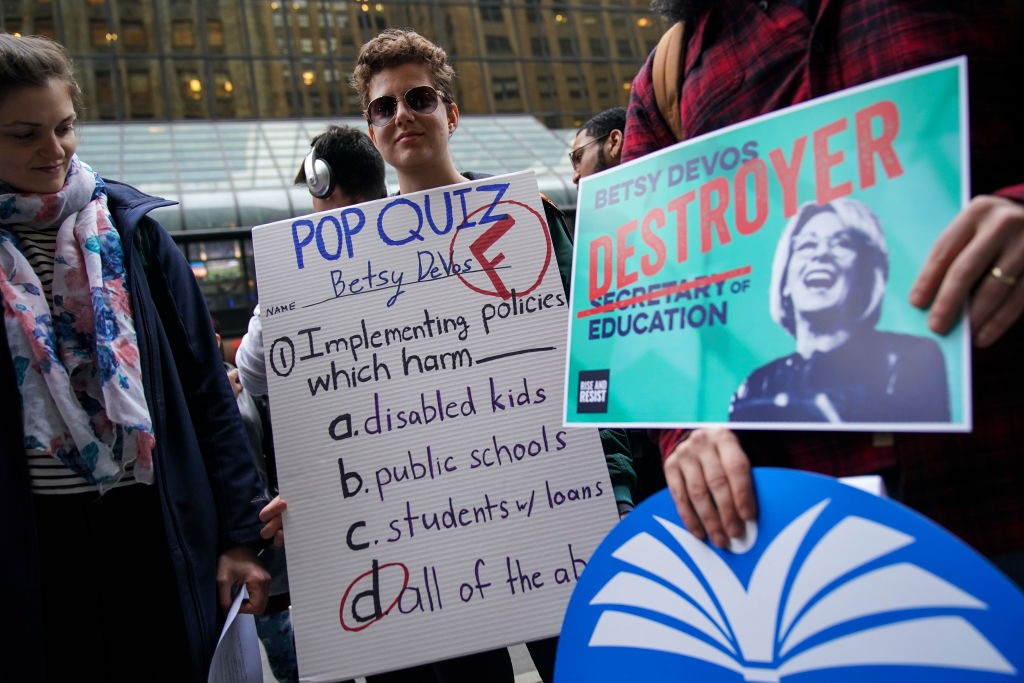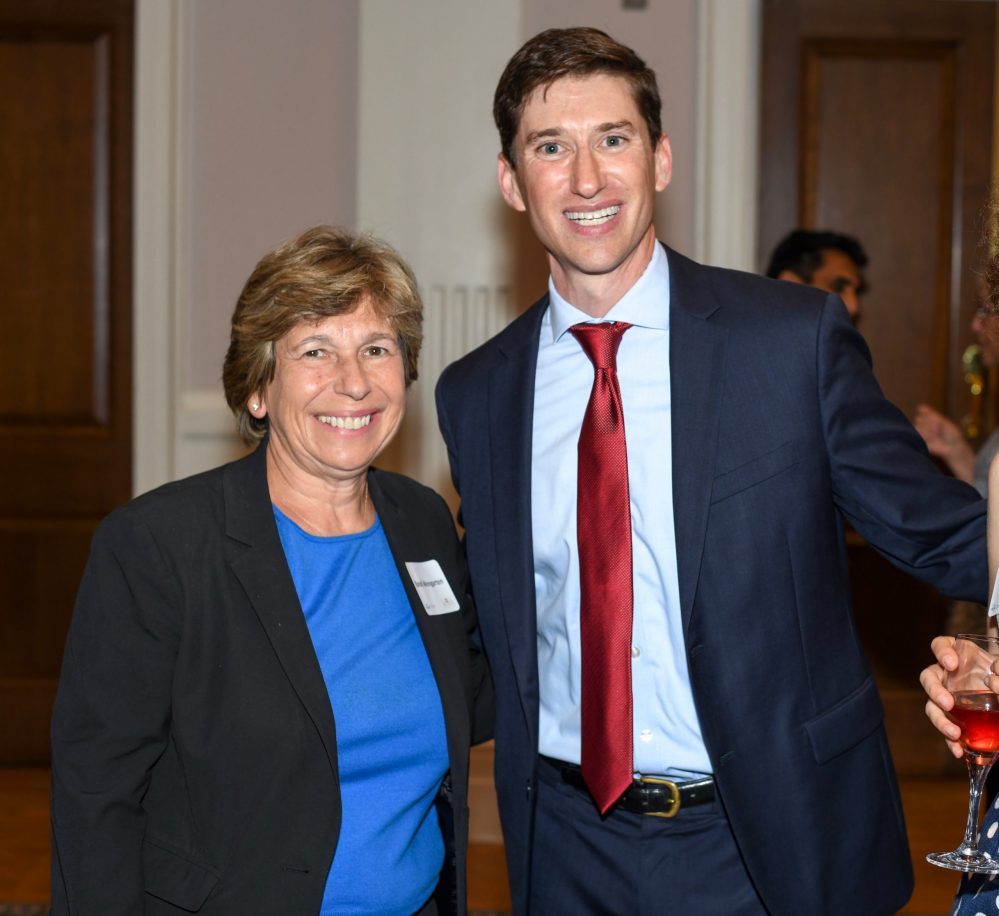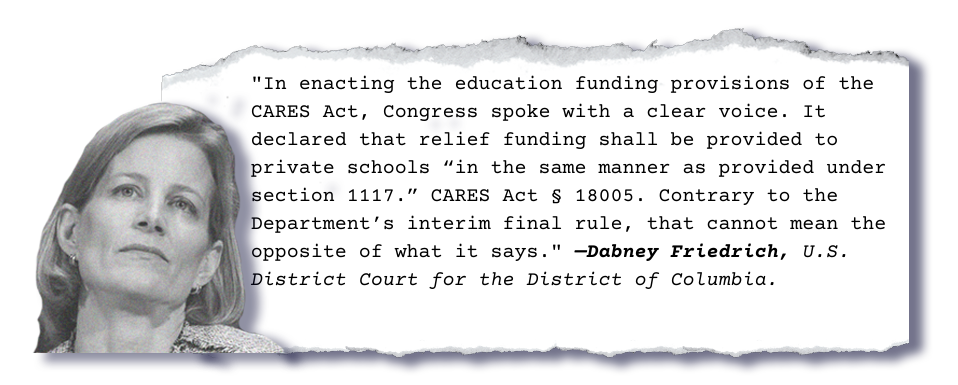DeVos on the Docket: With 455 Lawsuits Against Her Department and Counting, Education Secretary is Left to Defend Much of Her Agenda in Court
By Linda Jacobson | October 26, 2020
Updated October 29
Betsy DeVos is the most-sued secretary in the 41-year history of the U.S. Department of Education.
In less than four years, DeVos and her department have been the target of more than 455 lawsuits — equivalent to being sued once every three days of her tenure, a 74 analysis has found.
By comparison, the review turned up 356 lawsuits against the department in the entire eight years Barack Obama was president.
The suits reflect the extent to which DeVos’s core agenda — including issues related to civil rights, special education and for-profit colleges — has played out in the courtroom.
“I’ve never seen or read about anything like this in my career,” said Phil Catanzano, an education attorney with the international law firm Holland and Knight. His knowledge comes firsthand: A veteran of the department’s Office for Civil Rights under Presidents George W. Bush and Obama, Catanzano has 18 active cases against the department.
When it comes to her education agenda, the record shows DeVos has racked up more losses than wins. Just last week, a federal judge in California rejected a proposed settlement in a suit brought against the department by student loan borrowers who claimed they were defrauded by predatory and often for-profit colleges. The case pointed to the secretary’s move to scale back Obama policies designed to protect those who were misled. In a scathing , the judge said her mass denials of loan forgiveness applications could cause students “irreparable harm.”
But there have been key exceptions. Also last week, a federal judge in Maryland a suit challenging revisions DeVos made to federal Title IX law designed to protect the rights of students accused of sexual misconduct.
The sheer volume of litigation is such that Jason Botel, a high-ranking administrator for DeVos until 2018, remembers that staff meetings frequently began with “a list of the latest lawsuits that had been filed against the department.”
The result is perhaps not surprising for a secretary who took office charged with erasing many aspects of Obama’s footprint in education, and one uniquely reviled by the nation’s powerful teachers unions and members of Washington’s advocacy class.

The analysis — which has been culled from court documents found on legal websites , and and converted into this searchable database — reflects the extreme divisiveness that has marked the Trump years. Many parties, from education organizations to states and school districts, say mistrust toward the department has grown far worse than it was under Obama and Bush.
One measure is the degree to which states have taken DeVos to court. Eight multistate lawsuits against the Trump administration have been related to education, compared with none during the Obama years, and 15 states have sued the department individually.
“That’s actually pretty significant, looking historically,” said Paul Nolette, a political science professor at Marquette University who tracks state litigation against the federal government.

Notably, the attorneys general behind those suits are Democrats, with Massachusetts, Pennsylvania, New York and California leading the way.
“Litigation is just becoming a more entrenched part of the whole policy process,” Nolette said. “States are just challenging everything.”
The department declined to answer questions from ���˶��� about the funds and staff time consumed by litigation.

In a statement released after this story published online, department press secretary Angela Morabito wrote: “The radical left and education establishment have done everything they could think of to try and stop Secretary DeVos’ student-first agenda, which threatens their grip of power. They also haven’t successfully stopped the Department from putting students first, returning power to local educators and families, and shrinking Washington’s control over education in America.”
At a speech last week at Hillsdale College, a conservative Christian school in her home state of Michigan, DeVos offered a of her record of loosening federal control over education, particularly in the area for which she has become most closely identified: school choice.
“At the end of the day we want parents to have the freedom, the choice, and the funds to make the best decisions for their children,” she said. “The ‘Washington knows best’ crowd really loses their minds over that.”
That passion has landed DeVos in legal hot water. Most recently, three federal judges, including one appointed by President Donald Trump, shot down her plans to rewrite a federal funding formula so private schools could receive millions more in pandemic relief than the law allows.
“She’s done quite a bit to poke the bear. And when you poke the bear, it tends to get angry.” —Ben DeGrow, the director of education policy at the Mackinac Center for Public Policy
Supporters say they are not surprised at how much of her agenda has ended up in court, given her drive to take on powerful interest groups.
“She’s done quite a bit to poke the bear. And when you poke the bear, it tends to get angry,” said Ben DeGrow, director of education policy at the Mackinac Center for Public Policy, a free market-oriented, Michigan-based think tank that has received funding from the Dick and Betsy DeVos Foundation. Because of DeVos’s past support of candidates in Michigan, he added, “the teachers unions had their sights set on her from the beginning.”
Erasing the Obama footprint
In many ways, the hyperlitigation can be seen as a direct reaction to DeVos’s attempts to scale back the department’s expansive role under Obama. During those eight years, it linked millions in federal grants to states and districts adopting policies such as the Common Core standards and using student test scores to evaluate teacher performance. At the same time, it bypassed Congress and issued a host of guidance and regulations that expanded civil rights protections for minorities and students with disabilities.

When attorney Shiwali Patel joined the department’s civil rights office in early 2016, she felt she was doing “exciting and important work” to help students who are often marginalized.
She started right before the department directed schools to allow transgender students to use bathrooms that match their gender identity. Though DeVos reportedly opposed the move initially, the Trump administration the guidance a month after he took office in 2017.

For Patel, it was a sign of things to come.
“From there, it was pretty clear they were not in the business of protecting civil rights,” said Patel, who left the department about a year later. Now senior counsel and director of Justice for Student Survivors at the National Women’s Law Center, she’s one of at least 10 staff members working on litigation against DeVos. The center currently has a lawsuit against the department over the new Title IX regulations, which she said weaken protections for victims of sexual violence.
The suit is among at least 36 brought against DeVos or her administration stemming from her attempts to undo Obama-era actions, ���˶��� found.
Neal McCluskey, director of the Center for Educational Freedom at the libertarian Cato Institute, said DeVos has “managed to stop a lot of the things that the Obama administration was doing that they didn’t like.”
One clear example was the 2018 removal of Obama-era intended to reduce racial disparities in suspensions and expulsions. that Black students are suspended at three times the rate of white students and that Black and Hispanic students make up over half of those involved in school-related arrests. But critics said the guidance hampered schools’ ability to effectively respond to crime, and DeVos cited it as another example of federal meddling.
The secretary also removed Obama’s 2014 policy, known as the gainful employment rule, requiring career training programs to prove their graduates would be able to find jobs and earn enough to pay back their student loans. Dropping allows for-profit colleges — to which DeVos has had — to get billions in student aid funding even if their graduates are unemployed and saddled with debt. DeVos, who has also appointed former officials from the to positions in the department, said removing the rule was an effort to treat all postsecondary programs, including for-profits, the same.
Cited for contempt
Student loans have proven to be a particularly nettlesome issue for DeVos.
Loan disputes have historically formed the bulk of lawsuits against the department, and it has been no different during her tenure. What is new, experts said, is the large number of students filing for loan forgiveness because their schools .

Last fall, DeVos earned the distinction of becoming the first education secretary to be of court and was ordered to pay a $100,000 fine for continuing to collect loan payments from former students of a defunct for-profit chain of colleges. And it took a to force the department to temporarily stop garnishing the wages of student loan borrowers — as required by the pandemic relief bill Congress passed in March.
DeVos also put off implementation of Obama-era regulations requiring online higher education programs to disclose whether they meet state licensing requirements. Scheduled to go into effect in July 2017, the regulation was delayed by DeVos for three years — until the National Education Association and the California Teachers Association in federal court last year.
“Courts are ruling against her all over the country,” said Aaron Ament, president and cofounder of the National Student Legal Defense Network, which has been involved in 12 higher education cases against DeVos and the department.

DeVos similarly postponed a rule meant to ensure that nonwhite students and those with disabilities are not overrepresented in special education or are unfairly punished in school. In 2016, 12 percent of Black students were referred for special education services, compared with 8.5 percent of white students.
That deferral marked the first time the Council of Parent Advocates and Attorneys, an advocacy and legal organization representing families of students with special needs, sued the department. Ultimately, a federal judge ordered the administration to implement the rule after an eight-month delay.
“We have never in our 22-year history sued an administration and we’ve done so now multiple times,” said CEO Denise Stile Marshall.The litigation is just the most visible symptom of her organization’s strained relationship with the department. Under previous secretaries, including Margaret Spellings, who led the agency in Bush’s second term, the advocacy community “felt more of a partnership with the department,” Marshall said. Staff members would share relevant documents in advance of their official release, for example.
Now, she added, “we have no idea what’s coming.”
‘They cut corners’
A key reason for the breakdown is that there is simply less staff at the department to do the sharing. In keeping with Trump’s frequent promise to it lost during his first year in office — 550, or roughly 13 percent of its workforce.
The came from the two units responsible for the lion’s share of litigation against DeVos: the Office for Civil Rights and the Office of Federal Student Aid.
“They want to get these quick political wins, but they’re being held up by the courts.” —Phil Catanzano, attorney
The result, said Ament of the National Student Legal Defense Network, is that the department is responding to lawsuits with a staff that “has been gutted.”
“I think they cut corners procedurally,” he said. “You’ll see consistently Trump and DeVos really failing to consider research and studies in a way that’s required.”

That’s what Judge Edward Davila of the Northern District of California wrote Sept. 3 when he DeVos’s request to dismiss a lawsuit over her rollback of the gainful employment rule.
In his opinion, he referred to a talk by DeVos, noting that “nowhere in this speech can the court locate an analysis” that explains why she eliminated the rule. Elsewhere, Davila, an Obama appointee, reprimanded the department for leaving out research to support its decision. “Of course, these references were not identified. In other places, the [department] cites … its own ‘analysis,’ but never clarifies what that analysis entails.”

Such thoughts are not confined to liberal members of the bench. In a , a three-judge panel for the conservative 11th Circuit Court of Appeals, led by George W. Bush appointee Chief Judge William H. Pryor Jr., ruled that a student loan servicer was misleading those in public service jobs into believing their loans were being forgiven. The company had said DeVos issued protected it from lawsuits alleging deceptive conduct. But the judges’ unanimous opinion deemed the secretary’s notice “not particularly thorough.”
In September, a Trump judicial appointee weighed in against DeVos, siding with plaintiffs over her controversial policy to distribute millions in federal pandemic relief funds to private schools. Judge Dabney Friedrich of the U.S. District Court for the District of Columbia became the third federal judge to rule against DeVos over the plan, saying the bill passed by Congress “left no gaps for the agency to fill and thus delegated no implicit authority to the department.”
“They want to get these quick political wins, but they’re being held up by the courts,” Catanzano said.
Jay Urwitz, a senior fellow at the American Council on Education, served as deputy general counsel in the department during the Obama administration. When someone sues the federal government, he explained, the plaintiff has to prove that the agency’s action was “arbitrary and capricious” — a very high bar.
It’s like facing an opponent who “starts from the 20-yard line or starts with a 6-0 lead in the seventh inning,” he said, adding that despite the advantage, DeVos’s department has still “managed to mess it up.”
Bypassing Congress
Experts say DeVos’s legal battles also reflect the large degree to which she has failed to push her agenda through Congress.
For example, Sen. Lamar Alexander of Tennessee, chairman of the education committee, wanted to address the gainful employment issue through a reauthorization of the Higher Education Act.
But that was almost two years ago. In the meantime, progress on the legislation has ground to a halt. Instead, DeVos withdrew the rule, and more than of the states sued her.
“The American system is such that if one area is not doing anything, it will move somewhere else,” Nolette said. But, as Obama learned as well, executive actions leave officials “legally vulnerable.”

DeVos’s attempt to get relief funds to private schools is another example of using executive rules to go places Congress chose not to. Early last year, the administration began pushing a $5 billion bill to give tax breaks in exchange for donations to private school scholarship programs for poor students. But it wasn’t until the recent negotiations over another pandemic relief bill that the majority of Republicans gave the proposal much attention.
Leslie Hiner, vice president of programs for EdChoice, a school choice advocacy organization, defended DeVos for trying to give flexibility during the pandemic to desperate parents trying “to make this work.”
“She has taken more slings and arrows than any of us will ever take in our lives,” she said.
Meanwhile, with the nation a week away from an election that could bring DeVos’s tenure to a close, some of the more explosive cases against her have yet to be heard. Three suits are still pending, for example, seeking to throw out her revisions to Title IX, an item the secretary clearly sees as part of her legacy.
At her recent , DeVos cited the change as an example of how the department has been “very methodical about our rule making and regulatory moves to do everything according to law.”
With roughly 125,000 public comments on the rule and overwhelming opposition to the changes, Catanzano speculated that DeVos likely knew the result would spark litigation. So, unlike its approach to rules on for-profit colleges or transgender students’ bathroom use, the department took its time, spending more than two years to craft the new regulation.
“A Biden administration would have a tough time pulling it down,” he said.
Lead Image: DeVos photo illustration (Getty Images / Meghan Gallagher / ���˶���)
Help fund stories like this.
